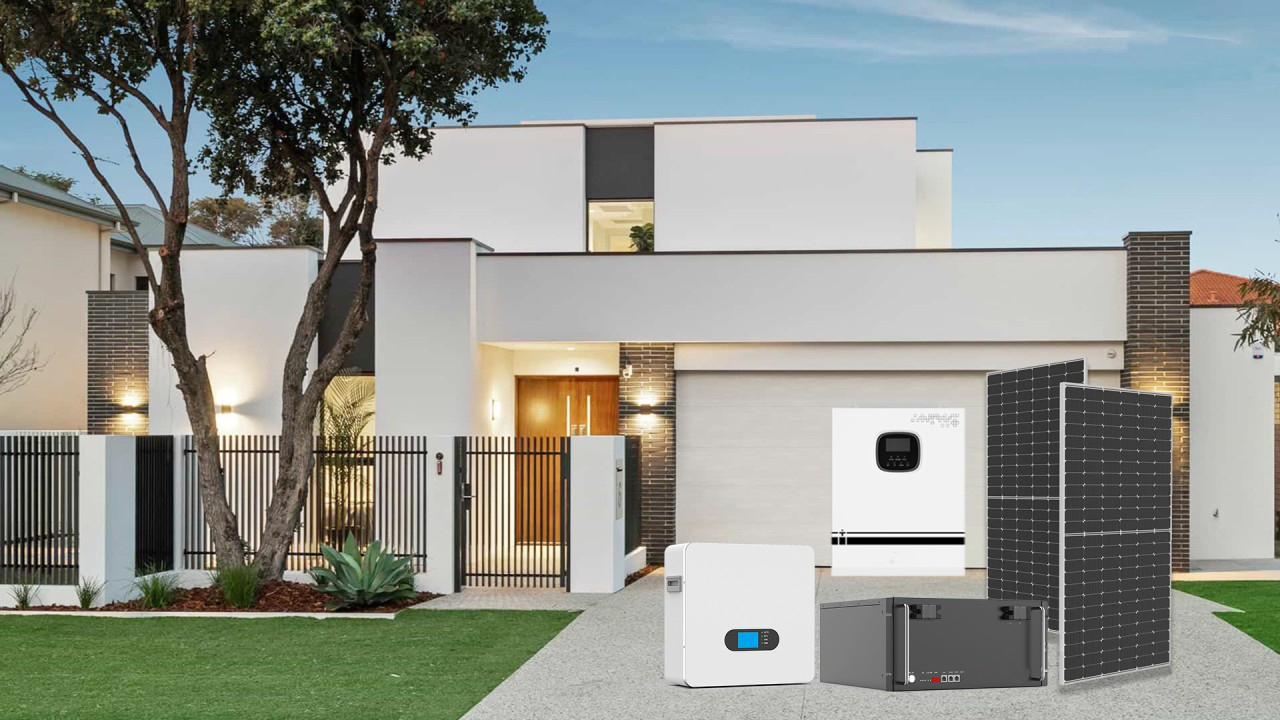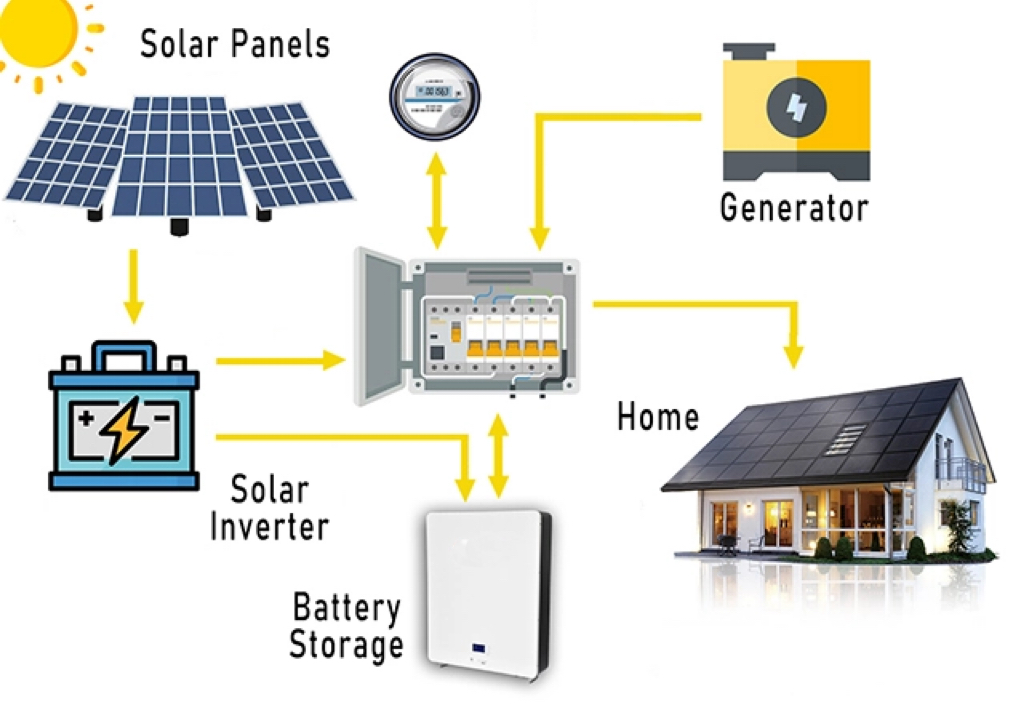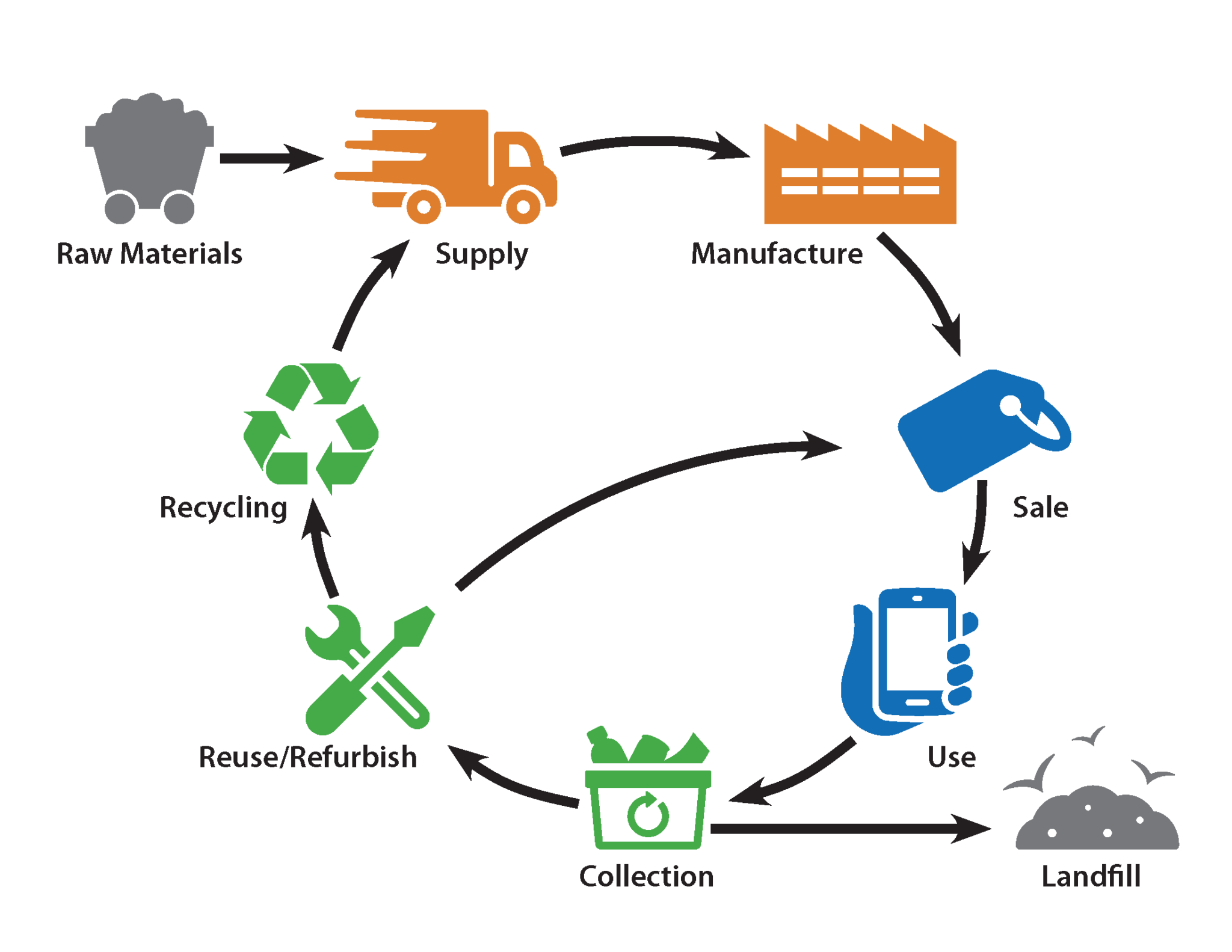
Lithium solar batteries have become the preferred choice for home energy storage because they last long, are low maintenance, and don’t take up as much space as other types of batteries.
When lithium batteries are used in conjunction with solar panels, excess solar energy can be stored in the battery and then released for home use when needed, such as at night or during power outages. Depending on the region, lithium batteries can even help save money on electricity bills.
Before installing lithium batteries, we need to know some relevant knowledge to help us make a suitable choice.
What is Lithium Solar Batteries?
When you decide to go solar, you start by installing a series of solar panels on your roof. These panels work by collecting solar energy and converting it into electricity. The inverter then converts direct current (DC) to the alternating current (AC) we use in our homes.

In most cases, home solar devices are connected to the local power grid. That way, the excess energy produced by the solar system feeds back into the grid, and you can draw energy from the grid when the solar system can’t produce enough electricity.
A solar batteries is a renewable energy storage system that stores energy generated by a solar system rather than sending it back to the grid. This way, when the solar panels do not produce any energy (such as at night or on cloudy days), you can use the stored energy. Lithium solar batteries are a type of energy storage device typically made from lithium iron phosphate.
How are Lithium Solar Batteries Different From Other Batteries?
There are actually several different types of lithium technology, including ordinary lithium, lithium ion, and lithium iron phosphate (also known as LiFePO4 or LFP). Ordinary lithium batteries are not rechargeable, so they are not suitable for solar systems.
Lithium-ion technology is already used in a wide range of rechargeable products such as mobile phones, golf carts and electric cars. Most lithium-ion solar batteries are deep-cycle LiFePO4 cells. They use lithium salts to produce efficient and durable battery products. Because they are deep cycle batteries, the performance of the batteries remains good even when the charging and discharging of the solar panels are inconsistent.
In the past, most solar cells used lead-acid battery packs, until Tesla developed the Powerwall I lithium solar batteries in 2015. Today, there are many types of lithium solar batteries on the market, providing homeowners with a variety of options to meet their different needs.
How Can Lithium Solar Batteries Be used as Home Energy Storage?

Lithium solar batteries are a rechargeable energy storage solution that can be used to store electricity in homes. They can be used alone or in conjunction with solar systems to store excess power.
If used alone, lithium solar batteries can be charged directly from the grid and then provide backup power to homes in the event of a power outage. They can also be used to avoid paying peak electricity bills, charging with grid electricity when it is cheap and discharging it when it is expensive.
However, combining a lithium battery with a solar system can bring greater benefits, especially if you can’t use net power metering. Lithium batteries can be charged using excess solar energy generated by solar panels, so you can power your home entirely with solar energy even when there is no sunlight.
What is The Usual Lithium Solar Battery Price?

Price is understandably a big concern for anyone considering solar systems and solar cells. The cost of lithium solar batteries varies widely, and can range from a few thousand dollars to tens of thousands of dollars, with larger commercial facilities likely to cost even more.
Despite the price difference, many people are willing to choose lithium batteries over lead-acid batteries because lithium batteries perform better and are easier to maintain. The total cost of solar cell installation depends on the brand of battery you choose, the functions of the battery, the number of batteries you need, and labor costs.
In general, the price of lithium solar cells is determined by the following key factors:
● Battery size
● Manufacturer
● Installation price
● Additional battery function
Advantages of Lithium Solar Batteries
For homeowners who need battery storage, lithium-ion batteries are the most popular choice, and the advantages of lithium solar cells are mainly the following:
Higher discharge depth (DoD)
The depth of discharge (DoD) of a battery is the ratio of the energy used in the battery to the total capacity of the battery. Lithium solar cells are deep cycle batteries that can discharge to a depth of 95%, which means you can use more battery energy without needing to charge it as often.
Long service life
Due to their high depth of discharge and lack of need for frequent charging, lithium-ion batteries typically have a long service life. Most lithium-ion solar cells have a minimum warranty life of about 10 years, or 10,000 cycles. Lead-acid batteries, on the other hand, have a warranty life of only about 5 years.
Higher energy density
The energy density of a battery refers to the amount of electricity a battery can hold relative to its physical size. Lithium-ion batteries can store more power and don’t take up as much space as lead-acid batteries, which is useful for homes with limited space.
High efficiency
Lithium-ion batteries have a higher round-trip efficiency rating than other types of solar cells on the market.Efficiency refers to the ratio of the energy available in the battery to the energy stored. Lithium-ion batteries are between 90 and 95 percent efficient.
Reduce maintenance
Lithium-ion batteries require almost no regular maintenance, you just need to make sure there is no debris in the battery. In contrast, some lead-acid batteries require regular maintenance work such as venting.
Disadvantages of lithium solar cells
Although lithium batteries have many advantages, there are still some disadvantages.
High cost
Lithium batteries tend to be the most expensive battery storage option, especially when compared to lead-acid batteries. It’s also important to keep in mind that while lead-acid batteries may be cheaper upfront, they must be replaced more frequently, increasing your overall storage costs.
Thermal runaway
Lithium batteries have a high risk of thermal runaway, that is, the risk of overheating or even catching fire. Although this risk technically exists, it is highly unlikely to happen if lithium-ion batteries are installed correctly.
Need protection
Lithium batteries are relatively prone to overcharge or discharge, which means they need extra protection to prevent problems compared to some other rechargeable technologies. But these protections are typically built into battery-powered solar systems and don’t have much of an impact on consumers.
Safety and temperature sensitivity
Lithium batteries contain highly volatile chemicals and are therefore sensitive to pressure, puncture and heat. In theory, they could catch fire in extreme circumstances. However, these risks have been considered and dealt with during the manufacturing and installation of the battery, so in actual use, the possibility of problems is very small.
How to Recycle Lithium Solar Batteries?
The recycling of lithium-ion batteries is mainly achieved by pulverizing the battery and mixing all the components. Once all the metals are mixed into a powder, they need to be separated by liquefaction or dissolution in acid in order to recover the desired metal.

In addition, sometimes batteries inside electric vehicles can be reused instead of shredding old batteries. Even if lithium-ion batteries can’t power a car, because of their long life, they can still be used in situations where energy storage is less needed, such as backup power.
Currently, recycling old batteries can be a bit of a hassle when it comes time to replace devices such as electric cars or batteries. But you can find certified electronics recyclers through the EPA website. Alternatively, manufacturers like Tesla would collect and reuse lithium-ion batteries at the end of their life.
What Makes Recycling Lithium Solar Batteries Difficult?
At present, the main difficulty facing lithium battery recycling is that the recycling technology is not advanced enough to extract and reuse the key metals in the battery in a more economical way than mining.
In fact, mining new metals is even cheaper than recycling the metals in batteries, making it possible to invest in batteries on a large scale. Unfortunately, if we make cheap lithium batteries that are not recycled, eventually our landfills could be full of e-waste.
Although battery recycling requires additional effort and cost, we need to find affordable ways to recycle so that we can reduce the extraction of new lithium, which releases large amounts of carbon dioxide. So using lithium and other metals from recycled batteries is a greener and more sustainable alternative.
In addition, finding a way to reuse all the metals in old batteries is very important, because there is a possibility that there will be a shortage of these metals, and reusing metals in old batteries will help us meet future demand.
Are lithium Solar Batteries The Best Solution?

In short, yes. For most residential and commercial solar systems, lithium solar batteries are indeed the best choice. Lithium batteries have long life, small size, and strong adaptability to the consiste
However, some systems may be better suited to other types of batteries. For example, in systems that rely primarily on batteries as backup power, sometimes lead-acid batteries are a better choice.
Conclusion
Lithium solar batteries are the best solar system for everyday residential use, to determine whether a solar cell is right for you, we GycxSolar can provide you with the best advice. We can tell you how much money lithium batteries can save you and whether you should consider installing such a system in your home.
Contact our experts today to discuss customized solar + energy storage solutions!
